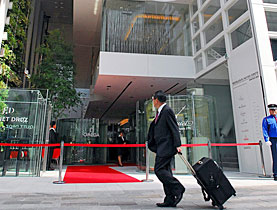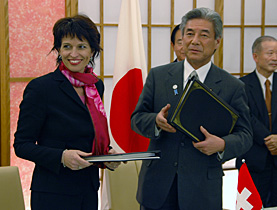Doing business the Japanese way

A free trade agreement with Japan earlier this year is expected to enhance Swiss business opportunities, but budding new entrants must first master the unique market.
Japanese consumers and business culture offer lucrative trade, but can also present a minefield to the unwary Westerner. Even global giants Nokia and IKEA stumbled after getting their homework wrong.
Zurich-based trading services company DKSH is more aware than most about the do’s and don’ts of doing business in the land of the rising sun. The firm’s predecessors established roots in Japan nearly 150 years ago.
“Contrary to popular belief, the Japanese market is very open and receptive, but you have to know the rules,” DKSH Japan president Wolfgang Schanzenbach told swissinfo.ch. But he believes Swiss firms have an in-built advantage over competitors.
“The ‘Made in Switzerland’ values of reliability, trustworthiness and good service are also ingrained into the Japanese. So certain basics translate very easily between the two countries,” he said.
“Nominication”
Companies attending a Japan business seminar in Zurich last month were warned about some potential hazards. These included ignoring local etiquette, trying to bypass local staff, and skimping on presentation or after sales service.
Swiss lift maker Schindler was one international company to drastically lose sales after a youth died in an elevator accident in 2006. The company’s subsequent communications strategy was partly blamed for orders drying up.
Business Network Switzerland (Osec), which hosted the event, also advised firms to do proper research into a market that is unlike any other in the world. Schanzenbach particularly agreed with this point.
“Whatever you want to supply in Japan, there are always a couple of local producers. Japan is highly sophisticated so you have to be sure that you know what else you can add to the product to make it fly,” he said. “Many companies still under-estimate this.”
Another catchword in Japan is “patience”, which translates into a series of personal face-to-face meetings with clients.
The local jargon throws up the word “nominication” – a combination of “communication” and the Japanese word for drinking (tea rather than alcohol): “Nomimasu”. Nominacation is the art of social business networking to develop trust before deals are discussed in detail.
FTA benefits
Presenting your unique product to the public must also be handled with care, according to Schanzenbach. The Japanese public loves a novelty, but they also need to feel personally connected to the product they are buying.
“Once Japanese customers find a brand they like, they are very loyal. But that loyalty must be earned through sound research, promotion and marketing,” he told swissinfo.ch.
The fact that Swiss exports to Japan have been booming in recent years shows that firms are doing something right. The Swiss-Japanese free trade agreement (FTA), signed in February and which came into force on September 1 this year, brings a further boost through tariff reductions and more friendly regulations.
Schanzenbach believes the treaty has greater symbolic than short-term financial benefits as many tariffs were low in any case.
And he believes that Japanese consumers, ravaged by years of economic hardship, are starting to follow new trends.
“There is a tendency to eat out cheaper and spend less on clothes. Consumers are turning their yen over twice before spending,” he said. “Producers will have to be smarter at finding ways to sell their unique, add-on value brands.”
Swiss Economics Minister Doris Leuthard arrives in Japan on Monday for a four-day visit to promote Swiss business interests following the implementation of the FTA.
Matthew Allen in Tokyo, swissinfo.ch
Swiss exports to Japan increased by 4.9% in 2008, totalling more than SFr7billion ($6.77 billion).
Japan is Switzerland’s third-largest trading partner after the European Union and the United States.
The most important Swiss exports to Japan are machinery, technical instruments, chemicals, pharmaceuticals and consumer goods, especially watches.
Japanese goods to the tune of SFr4.1 billion – mainly precious metals, cars, electronic goods and machinery – made the return trip (up 18.2 per cent). However, these figures do not take into account Japanese goods manufactured in Europe.
There are around 140 Swiss companies directly represented in Japan. As of October 2005, there were 6,887 Japanese nationals residing in Switzerland and 1,406 Swiss nationals residing in Japan.
The roots of DKSH in Japan can be traced back to an 1863 Swiss trade mission that included 24-year-old merchant Caspar Brennwald in its ranks.
After playing a part in the Swiss-Japanese Treaty of Friendship and Trade, Brennwald – together with partner Hermann Siber – founded a company called Siber & Brennwald in Yokohama.
The firm specialised in importing Swiss cloth, embroidery and watches to Japan and later facilitating the trade of silk in the opposite direction.
In 1909 the company changed its name to SiberHegner and later to Nihon SiberHegner. The firm established trading links throughout Asia, dealing in a wide range of goods.
In 2002, Nihon SiberHegner merged with another Swiss-run firm, Diethelm Keller Services Asia, to form DKSH Holding. In April this year, the SiberHegner subsidiary was renamed DKSH Japan.
DKSH Japan now helps companies around the world – in such diverse fields as pharmaceuticals, chemicals, machinery, consumer goods, food products, performance materials and technology – to establish themselves and to trade in Japan.

In compliance with the JTI standards
More: SWI swissinfo.ch certified by the Journalism Trust Initiative













You can find an overview of ongoing debates with our journalists here . Please join us!
If you want to start a conversation about a topic raised in this article or want to report factual errors, email us at english@swissinfo.ch.